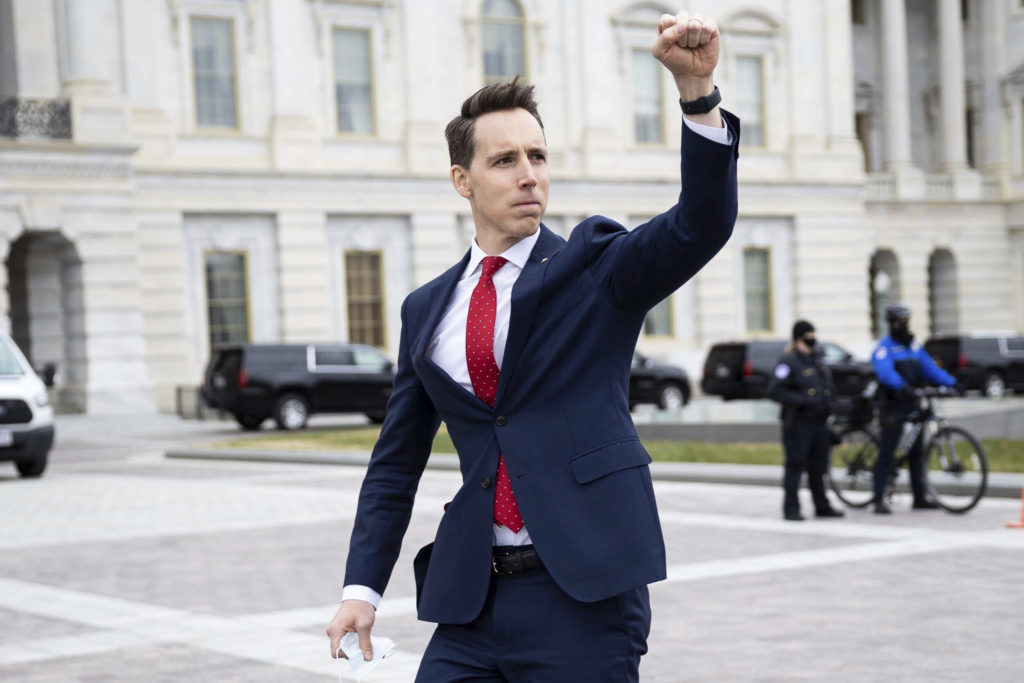Onward Christian Soldiers

Katherine Stewart has an op-ed this morning reminding us that people like Josh Hawley are opposed in principle to liberal democracy, and that we know this because they tell us this themselves, constantly and unambiguously:
In multiple speeches, an interview and a widely shared article for Christianity Today, Mr. Hawley has explained that the blame for society’s ills traces all the way back to Pelagius — a British-born monk who lived 17 centuries ago. In a 2019 commencement address at The King’s College, a small conservative Christian college devoted to “a biblical worldview,” Mr. Hawley denounced Pelagius for teaching that human beings have the freedom to choose how they live their lives and that grace comes to those who do good things, as opposed to those who believe the right doctrines.
The most eloquent summary of the Pelagian vision, Mr. Hawley went on to say, can be found in the Supreme Court’s 1992 opinion in Planned Parenthood v. Casey. Mr. Hawley specifically cited Justice Anthony Kennedy’s words reprovingly: “At the heart of liberty,” Kennedy wrote, “is the right to define one’s own concept of existence, of meaning, of the universe, and of the mystery of human life.” The fifth century church fathers were right to condemn this terrifying variety of heresy, Mr. Hawley argued: “Replacing it and repairing the harm it has caused is one of the challenges of our day.”
In other words, Mr. Hawley’s idea of freedom is the freedom to conform to what he and his preferred religious authorities know to be right. Mr. Hawley is not shy about making the point explicit. In a 2017 speech to the American Renewal Project, he declared — paraphrasing the Dutch Reformed theologian and onetime prime minister Abraham Kuyper — “There is not one square inch of all creation over which Jesus Christ is not Lord.” Mr. Kuyper is perhaps best known for his claim that Christianity has sole legitimate authority over all aspects of human life.
A lot of liberals can’t face up to the fact that certain variants of Christianity that are very widespread in America today, specifically fundamentalist evangelical Protestantism and reactionary integralist Catholicism, are just as radically incompatible with liberal democracy as are the variants of Islam that today are the state religions in countries like Iran and Saudi Arabia. The only difference is that in the latter countries the theocrats have won, while in America the battle with them is ongoing.
Of course there’s a deep historical irony here, which is that the current tactical alliance between fundamentalist evangelical Protestants and integralist Catholics is, theologically speaking, as perverse as one between Sunni and Shia theocrats. Here is a quote from Isaiah Berlin’s great essay on how 20th century fascism had one of its deepest roots in the reactionary Catholic backlash to the French Revolution:
The most dangerous enemy of the human race — the destroyer whose aim and function is to sap the foundations upon which all societies rest — is the Protestant: the man who lifts his hand against the universal church. Bayle, Voltaire, Condorcet, are but feeble secular disciples of the great subverters: Luther, Calvin, and their followers. Protestantism is the revolt of individual reason or faith, conscience against blind obedience, which is the sole basis of all authority: hence it is au fond political rebellion. No bishop, no king.
But this is the sort of potentially inconvenient incongruity that can no doubt be ironed out “later.”
It’s important not to tar all Christians with the theocratic brush, just as it’s important not to treat all Muslims as if they in favor of a society-wide imposition of Sharia law. But, especially in oh-so-tolerant liberal circles, it’s also important to acknowledge that, in America today, large numbers of Christians are, like Hawley, in favor of transforming America into a Christian nation, in the same sense that the England of Elizabeth I was a Christian nation, or the France of Louis XV was a Catholic nation.
Again, we know this because they tell us so. It would be prudent to take them at their word.


